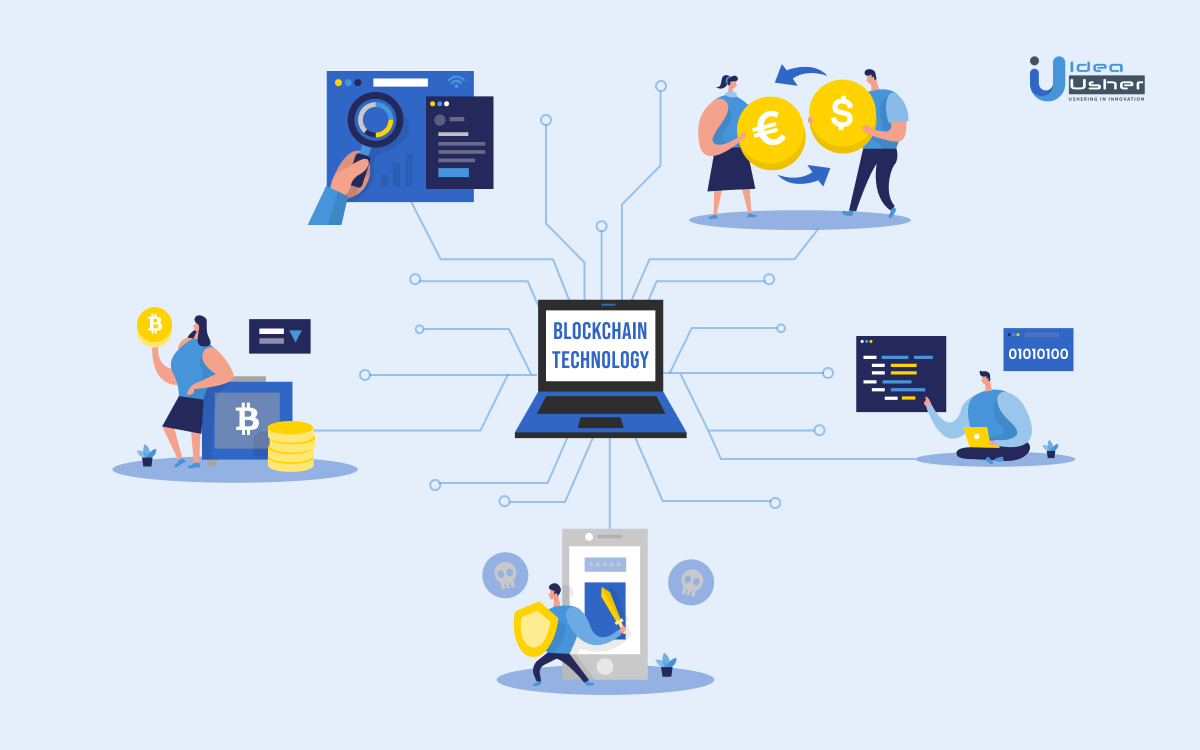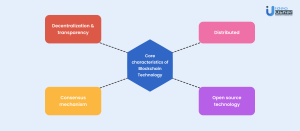- What is blockchain technology and how does it work?
- Core characteristics of Blockchain Technology
- Blockchain Use Cases in Banking & Finance
- Blockchain Applications in Business
- Blockchain Applications in Government
- Blockchain Applications in Other Industries
- Real world examples of top 5 blockchain mobile applications of 2020
- Final words
- FAQs

- What is blockchain technology and how does it work?
- Core characteristics of Blockchain Technology
- Blockchain Use Cases in Banking & Finance
- Blockchain Applications in Business
- Blockchain Applications in Government
- Blockchain Applications in Other Industries
- Real world examples of top 5 blockchain mobile applications of 2020
- Final words
- FAQs
What is blockchain technology and how does it work?

Blockchain is a digital ledger where data about transactions between two parties. It ensures data cannot be altered or deleted. And transactions are recorded and stored in chronological order using cryptographic techniques.
Banks are already experimenting with blockchain technology to lower costs for conducting transactions. Other use cases are to provide new services to consumers and verify the identity of companies. What are companies in other industries doing with blockchain? Let’s find out.
Core characteristics of Blockchain Technology

A blockchain is a constantly growing collection of records known as blocks that are linked and guarded using cryptography. Each block typically contains a hash pointer as a link to a previous block, a timestamp and transaction data.
This technology is highly secure by design, and they are an example of a distributed computing system with high Byzantine fault tolerance.
Following are the 4 properties of Blockchain.
1. Distributed
Distributed Ledger Technology (DLT) is a combination of technologies that allows multiple parties to record and update information on a shared digital ledger.
It uses cryptography to enable each party to access the data only they are authorized to see and ensure everyone has access to an up-to-date version of the ledger. No centralized version exists, and no user controls it directly.
2. Open source
Blockchain is an open-source technology. Anyone can take the existing technology, modify it and create their own “fork.” However, it is worth noting that no one can claim ownership or authorship of the original software.
This means that any modification made to blockchain technology risks being rejected by the global community.
3. Consensus mechanism
The consensus mechanism is a critical component of Blockchain. It is the process by which the node verifies and accepts the transactions in the Blockchain.
The nodes do not communicate directly with each other. Instead, they share a common reference point, i.e., a consensus mechanism.
4. Decentralization & transparency
There is no centralized database storing all the data; instead, it’s spread across a network of many different computers. Decisions about changes to the data are also made by consensus of the network participants. It ultimately ensures retaining transparency.
Blockchain Use Cases in Banking & Finance

A growing number of financial institutions are experimenting with blockchain-based products using cryptocurrencies to handle transactions.
1. International Payments
Banks use blockchain technology to create a permanent, public, transparent ledger for recording the movement of funds on a per-transaction basis. Using this public ledger, a financial institution can avoid the need for a customer to provide proof of their identity every time they make a transaction.
2. Capital Markets
The issuer creates a smart contract on a blockchain that defines the new security conditions to be issued and traded. The smart contract is then linked to new digital security, for example, a token that can be listed and sold on the new blockchain platform.
The platform then manages the security lifecycle from beginning to end, from subscription to trade maturity, by providing marketing, distribution, settlement, and custody services.
3. Trade Finance
Traditional trade finance processes take up to 45 days, and cross-border transactions can stretch to 60 days. This inhibits the business process and may result in missed business opportunities for both importers and exporters.
This technology can drastically increase the speed of trade finance processes by offering a real-time settlement.
4. Money Laundering Protection
A new way to stop money laundering and ensure that the people, banks, and companies providing services to you are who they say they are using smart contracts. It enables businesses to harness the power of blockchain technology to identify the ultimate beneficial owner(s) of a bank account – providing unprecedented transparency, traceability, and security.
5. Peer-to-Peer Transactions
Peer-to-peer transactions (p2p) are transactions made directly between two parties, peers, without an intermediary. All this info is stored in a decentralized blockchain, which is not controlled by one central power or authority helps to make the transaction process hassle-free.
Blockchain Applications in Business

1. Secured transaction
One of the most optimal use cases of blockchain technology is secured payments and this helps businesses to avoid any kind of frauds related to transactions. Moreover, there is easy traceability of every single transaction.
2. Healthcare
The healthcare industry is at the forefront of the blockchain revolution. As a cryptocurrency and decentralized public ledger that makes transactions transparent, this technology can be applied to various business use cases in healthcare. In particular, the benefits of blockchain applications in healthcare would be helpful in other necessities such as:
- data management,
- financial transactions,
- clinical research,
- medical record storage, and
- digital identity.
3. Real Estate
It is the best solution for real estate transactions because it provides security and trust.
- It proves property ownership
- Allows property transfer to occur swiftly
- Protects data by keeping it safe from hackers.
Many other applications within the real estate world will benefit too. The use of smart contracts can eliminate the need for third-party verification services like appraisers, inspectors, notaries, and lawyers, thus reducing costs and time to close deals.
4. Media
The role of blockchain in the media industry is one of the most promising ones.
- It is possible to store data about the authors’ rights transfer,
- Make transactions utilizing smart contracts
- Use cryptocurrency in advertising.
Other opportunities are still far from realization, but when it happens, blockchain might become an integral part of the media industry because it allows it to solve many severe problems in this sphere.
Blockchain Applications in Government

1. Record Management
Blockchain technology now stands upfront to protect, verify and manage documents. By timestamping the records on the blockchain, you can be sure that the paper’s contents will never be changed or corrupted.
This blockchain application ensures that you have a verified copy of the document against any fraud or manipulation attempts.
2. Identity Management
Many forms of identification, such as driver’s licenses, voter registration cards, and social security cards, rely on governments to confirm the identities of individuals.
Governments use this technology to confirm the identity of citizens by asking them to verify their documents.
3. Voting
Digital voting may only count the total number of votes, and it is impossible to track and verify the individual record of each person’s vote. The government can use blockchain technology to make the information more reliable and accountable.
4. Taxes
By tax season, most of us want to get it over it. We’re tired of hearing about taxes. We’re tired of dealing with the paper, getting our payments together, and preparing forms. Government agencies generally don’t find the process fun, either.
Using distributed ledger technology, various authorities could maintain a public ledger of taxes paid to track revenue streams more effectively, including payroll taxes and property taxes.
Everyone benefits here! taxpayers no longer have to wonder if their tax bills are accurate, and agencies get the more consistent measurement for budgeting and forecasting.
Blockchain Applications in Other Industries
1. Financial Management and Accounting
Blockchain is almost like a public ledger where it can provide transparency and trust of money flow. Implementing this technology in financial management and accounting will simplify the complex paperwork of processing the ledgers.
Bank operations will also increase efficiency by reducing costs.
2. Record Management
Blockchain technology is what makes Bitcoin work. But more than Bitcoin, the company can use this technology to record anything of value. Share on X It has the potential to increase efficiency in record management companies while also creating new opportunities for companies.
3. Cybersecurity
Cybersecurity is now not possible without the deployment of technologies that emerged with this type of technology, including cryptography, consensus mechanisms, distributed ledgers, and smart contracts.
The cybersecurity industry is now at the cusp of transformation, thanks to blockchain technology.
4. Big Data
A blockchain is an excellent tool for storing big data due to its immutability and the fact that each computer on the network constantly verifies the information held on it.
5. Data Storage
Data storage has become more secure than ever because of blockchain. It is a distributed public ledger that contains information about transactions made on the network. It is immutable and ensures the company will never lose your data.
Real world examples of top 5 blockchain mobile applications of 2020
Ethlance: Freelance job portal
Cryptokitties are digital kittens that you can buy and breed. Cryptokitties is a digital collectible. Just like how baseball cards, beanie babies, and pokemon cards got us all collecting things as kids, cryptokitties is the new digital collectible.
Coinbase: Crypto exchange platform
This technology has paved the way for one of the most profitable things to trade: cryptocurrency. Coinbase allows you to invest your money in cryptocurrencies.
CryptoKitties: Collect and breed digital cats in a game
Cryptokitties are digital kittens that you can buy and breed. Cryptokitties is a digital collectible. Just like how baseball cards, beanie babies, and pokemon cards got us all collecting things as kids, cryptokitties is the new digital collectible.
BitPay: Payment service app
You can use the BitPay Card at any vendor that accepts Mastercard card payments and to make withdrawals from any ATM that accepts Mastercard. The BitPay Card has an EMV chip for additional safety and can accept contactless payments.
Augur: Prediction Voting
Augur.net uses the this particular to create a prediction market for any event of high interest. The project solves the problem that most prediction market designs have had—event censorship—using an Ethereum-based transaction system coupled with decentralized registries for event outcomes.
Final words
Lack of understanding of blockchain technology can create a gap between potential adopters and users. Hence the technology might never gain the widespread adoption it deserves.
Blockchain Applications and their use cases deliver essential information to help knowledge workers understand why this technology is a revolution in the making.
In this blog, we clearly explained what a blockchain is, how it works, and how it is applied to solve real-world business problems.
FAQs
1. How do you see the blockchain application and its role?
Blockchain is the future of the internet.
It is a marketplace that encourages cooperation for mutual benefit between members of the platform. It is like a Facebook page where users cannot be denied access based on their location or affiliation.
2. Who can use the blockchain applications?
Using blockchain has nothing to do with understanding how blockchain works.
For example, to switch on a light bulb you don’t need to know how the wiring is placed behind the walls.
3. How will we be able to benefit from blockchain technology?
As you must have got the idea after reading about blockchain applications and their use cases, the impact of this technology is impeccable and currently reflects a bright future. So, adopting this technology to your business will give it a fair advantage in the future.









Aditya Mishra